Oral history is a research method that utilizes individuals’ verbal testimonies to record and analyze events, people, and lived experiences. This approach is valuable in studies seeking a deeper understanding of human experiences, especially for historical events requiring more written documentation. Oral history can help fill gaps in written history and showcase the human dimensions of history. The bitter memories of the survivors of the genocide do not end with the brutal torture and suffering they experienced. Therefore, revealing the crimes based on evidence and documents and drawing global attention to the continuation of seeking justice is essential. What you see here is based on documents and extensive interviews conducted between 1998-2005 with the survivors of the Anfal genocide of the Kurds in Iraq, which the Iraqi government perpetrated during the Ba’athist regimes and Saddam Hussein. They were imprisoned in the Nugra Salman castle in the Salman area of the Al-Muthanna province in southern Iraq. They lived in the villages of Kurdistan, Iraq, before the Anfal operation.
According to the testimonies of the survivors of the Anfal operation in 1988, the Ba’ath Party army, after destroying and burning their villages, arrested everyone, regardless of gender, age, or religion, simply for being Kurdish. Most of the detainees, including older people, young women, and children, were forcibly transported to the most remote parts of Iraq. They were shot at the edge of mass graves and half-buried alive in these graves. Some were sent to concentration camps and military fortresses and tortured to the brink of death. This operation demolished 4,500 villages and ten administrative centers, such as towns, municipalities, and governorates. During the Anfal military campaigns in 1987 and 1988, widespread attacks were carried out both on land and from the sky. Chemical weapons were used against the Kurdish people 285 times, with the chemical attack on Halabja being one of the most prominent examples.
The Anfal operation, which was carried out in eight phases throughout Kurdistan, buried 182,000 Kurds alive. In addition to the existing case files and documents, Human Rights Watch published a detailed report in 1992 titled “Genocide in Iraqi Kurdistan.”
Nugra Salman Fortress, one of the most brutal military fortresses of the fallen Ba’ath regime, located in southern Iraq in the Maysan province in the Salman area, has the phrase “Welcome to Hell” written above its entrance and another word on its rear door which reads, “It’s rare that someone stays here for three months and survives.” According to eyewitnesses and found documents, the torture in the Nugra Salman prison was often to the point of death, and the cause of death for most victims, whose ages ranged from 6 months to 90 years, has been documented as internal bleeding and brain strokes. This is in addition to the regular killings and live burials of people.
These documents were issued as death certificates by the Salman Health Center, based on the official letter from the Salman Fortress with different numbers and dates, signed by the fortress’s security officer as the informant.
Dr. Samir Wadih Shakir signed those documents and prepared the death certificates of the victims. All of this is reported in the official letter from Nugra Salman with different dates and numbers, as well as the signature of the fortress’s military officer. Most of the documents read: “This deceased has no official documents, but these papers have been prepared upon the request of one of the military officers of Salman Fortress and should not be given to anyone.” In other parts of the documents, it is written “Occupation: Prisoner,” and for children, “Child Prisoner,” Religion: Muslim, Nationality: Iraqi,” and under the reason for imprisonment, it is mentioned: “Anfal Operation.”
They are Iraqi Muslims, but they were killed under the title “Anfal,” which is the name of a verse in the Quran. This belief and culture are Arab supremacy, primarily Arab Ba’athist chauvinism. The Iraqi Ba’ath regime massacred the Kurds merely because they were Kurds. Because according to their ideology, all nations living in the Arab world are foreigners and have no rights. This chauvinistic belief is evident in their policies against other countries.
One of the survivors of Nugra Salman counted 520 people in the detention section who lost their lives under torture until his release. According to some health center employees, they only prepared death certificates for the victims, but they never received any bodies.
Amina, another witness and survivor from Nugra Salman, says, “After four months of staying there, a disease spread among the prisoners; 30-40 people died overnight due to this disease. Their bodies would turn black and skinny; after catching this disease, it was hard to recognize anyone. The reason for the disease was the filth, bad food, and lack of bathrooms. She says that in those four months, no one took a bath.”
Leila, who was thirteen years old during the Anfal operation, spent six months with her family in Nugra Salman prison. She says, “We were teenage girls and boys, and from dawn till dusk, we had to clean seven toilets. Six toilets were covered with cement, but the last one was open. We had to gather the waste from all the toilets daily and pour it into the seventh toilet. Older men said that the seventh toilet led to the prisoner-holding area in the basement of the fortress. For us, this was a horrifying torture. I got a skin disease due to this filthy and disgusting torture, and I still suffer from it. I can never forget those days.”
Mam* Ahmad, who returned from Nugra Salman, says that just because he protested and asked them, “Why are you treating our women and children this way!?” He was tortured in the basement for a week. Mam Ahmad also speaks about Hajjaj, who was in charge of Nugra Salman prison then. He told us that no one has the right to bow to God, but they should turn to him. He said to me, if you pray to God next time, I will hang you upside down and light a fire under your nose because you are an infidel.
Fatima is another witness. She says, “The water of Nugra Salman was dirty; it tasted bitter and was filled with tiny debris. People, having no other choice, drank it and later died. In one night, 100 people, including my husband and daughter, lost their lives. That night was horrifying, and I cried until morning. I was scared because of the stories about the starving dogs of Nugra Salman dealing with the bodies. After a few days, we found out that the bodies were buried together in a mass grave.”
Mam Nouri** describes Nugra Salman as Judgement Day. He says, “It was hell there. We were hungry and thirsty when we arrived because they gave us nothing for 24 hours. Suddenly, a man named (Hama Sadqi) from the Dar-Ekhtiyar region shouted for water and food, and the soldiers came, beat, and tortured him.”
He continued, “There were broken wheelbarrows there. They would place the bodies on wheelbarrows. Every morning, there were 6 or 7 bodies on the wheelbarrows. Some of them were left out for several days. To bury the bodies, they would send a few prisoners. We only had one shovel to dig the graves, which was very hard, and the soldiers wouldn’t give us time to dig, so we would only dig a small hole. In reality, it wasn’t burying; it was just covering the bodies so they weren’t left on the ground. The soldiers mockingly said that the starving dogs should also have something to eat. These words and tales were disconcerting to us.”
He said, “On the door of some of the rooms in Nugra Salman, the word ‘Viel’ was written, which is the name of a well in hell. There were filthy halls where they had placed more than a hundred people in one hall; there was no space. We slept side by side. Throughout the time we were imprisoned, we only had dry bread and foul-smelling water. Sometimes, they gave us a little soup.”
I clearly remember after three months in prison, they told us they had gotten watermelon for us. “Send two people from each hall so we can give you watermelon,” they said. We were delighted. After waiting 24 hours, they sent each of us a small piece of rotten watermelon. Many prisoners threw it away, and I also threw it away.
The bitter and painful memories of Mam Nouri were endless. He kept sharing one after another. Sometimes, he would take a photo of his wife and children from his side pocket and look at it. With a loud sigh, he would say, “I don’t know what misfortune befell you all.” He continued, “Fatimah Mohammad***, my wife’s cousin from Aghjalar, went to get water from a tanker parked in the yard without asking the soldiers because she was thirsty. When she touched the water tap, a soldier brutally beat her with a metal baton. Mam Nouri says, “We tried to pull her inside, but she died before we could get her in. Ten people from our village died. Anyone who asked for bread and water was hung upside down, and they would light a fire right under their nose.”
Adalat Talabani, one of the survivors of Nugra Salman, in the book “Anfal and its Secrets,” says that when the prisoners were tortured, they were subjected to the most brutal forms of torture.
For example, they were forcibly placed on broken bottles, or sometimes, the men’s genitals were pressed with pliers until they fainted.
He also wrote, “During the hot hours of the summer, they would tie one or two women to a post in the courtyard of the fortress until they fainted. No one was allowed to approach them. The soldiers drank alcohol at night and forced the women to sing and dance.”
I asked Mam Nouri about Hajjaj, and he said: “He was the security chief of the fortress, responsible for all the tortures and destructive behaviors against the prisoners. I once saw Hajjaj kill seven people. He always walked the corridors and passed the halls. He would ask the soldiers accompanying him, ‘Are these the Peshmerga?’ They would reply, ‘Yes.’ He would then laugh out loud. He would line up the pregnant women and hit their stomachs with a hose, saying, ‘They must die because they are carrying traitors; they are traitors.’
He said with a choked voice, “Whenever they called any woman or girl, she either wouldn’t return or would come back visibly distressed and struggling to speak through sobs. Through the whispered conversations among the women, we would understand what horrors they had faced. But being imprisoned, we were helpless.” He continued, “One of Hajjaj’s favorite methods of torture was to make us come out in the scorching hours of summer and stare at the sun for an hour and a half. Those who wouldn’t look were beaten. This torture was brutal, especially in the blazing summer. Some would faint, while others would die from this ordeal.”
“One late night, Hajjaj came and told everyone to come out. He said, ‘We thought your fate would be like the Barzanis, but unfortunately, you will be released.’ He announced a general pardon, and before returning us inside, they began beating us. We were in shock, each of us scattering in different directions. The next night, they told the first 500 people to get on military vehicles to be transported to Sulaymaniyah. But no one believed it, and people were hiding in fear of being executed. Eventually, under threats and physical coercion, we boarded the vehicles. We survived and were released, but on the condition that we never return to our villages.”
Note:
*Mâm: In the Kurdish language, it means ‘uncle.’ It is used as a prefix to the names of elderly men as a sign of respect.”
**Mam Nury is a witness of Nugra Salman and one of those we chose as a surviving witness to meet with Andreas Mavromatis, secretary of the UN Human Rights High Commission in Amman, on 4-6 March 2004 after the Iraqi freedom operation. He told his and his nation’s story during the meeting, which was pointed to in the UN meeting (No.60 –point 9) on 16 April 2004, which was Kurdish mass killing day. The delegate included three witnesses. The meeting between Mam Nury and Andreas Mavromatis was held after we met with Andreas in December 2003.
*** The document below is named after Fatima Mohammed, to whom Mam Nury referred regarding her death and how she passed away.


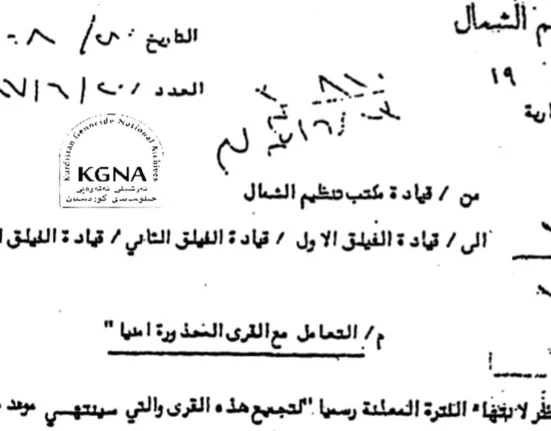
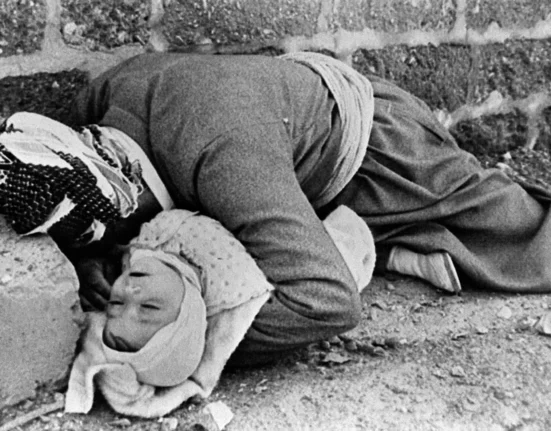
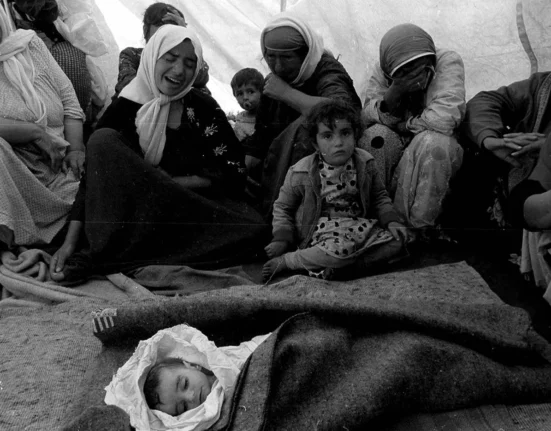
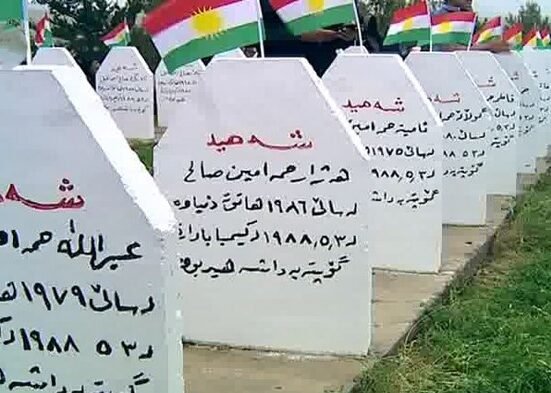
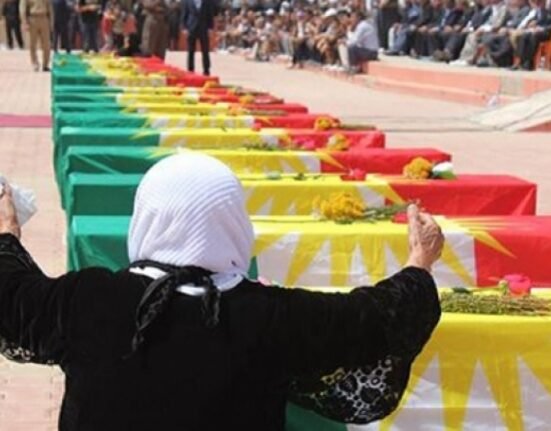
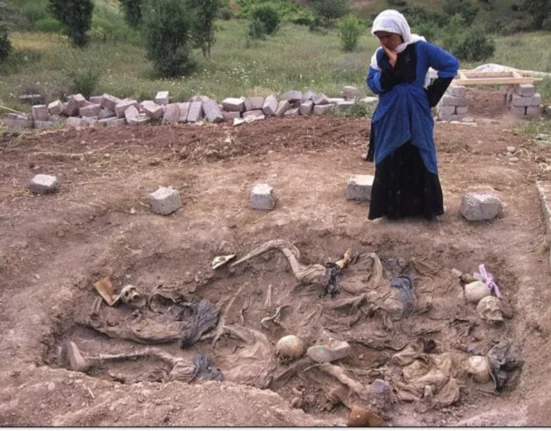
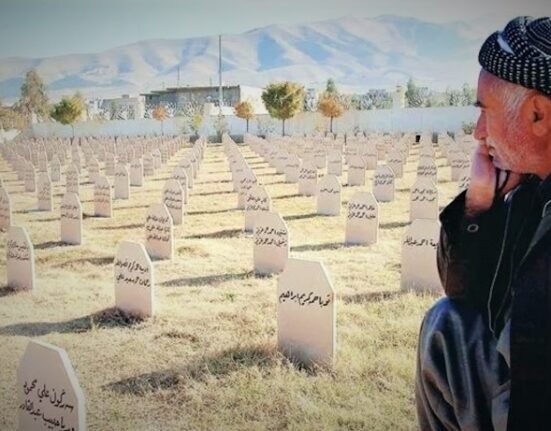

Leave feedback about this